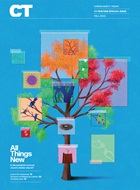
Really, I have nothing against introverted men. In fact I have been in love with one for more than thirty years. It's just that for the past two thousand years, it seems, someone gave them the pen, and they have done the largest part of writing about spiritual formation. And like all of us, they bring a specific perspective to the topic.
One can hardly blame them. We all primarily see the world through our own lens. The problem is, especially in this area of following Jesus, it can make the rest of us, well, feel pretty inferior.
Two thousand years of introverts elevating contemplation, reflection, solitude, and journaling into the preeminent ways to know God. Now, please don't hear what I'm not saying. Every one of those practices is wonderful. There is a rich history of how people following God have engaged those practices to help them know and experience God in profound ways. I am one of those people. My guess is you are as well.
Those exercises do things for our soul that only they can do. But they are wholly inadequate to developing a rich interior soul that is woven to God.
Teaching Everyone the QT
When I was growing up, what I heard, pretty much exclusively, was that maturing as a Christian was all about the Quiet Time. It had to be 30 minutes "to count" and 45 was better. What wasn't said but we all learned anyway was that sometime later that day, you had to figure out a "humble" way to let everyone know you'd had your Quiet Time. "As I was reading in Amos this morning …"
It needed to be done in the morning (that part always confused me; I'm not sure even God wants to talk to me first thing in the morning).
And then there was an acronym to follow, the most popular being ACTS—Adoration, Confession, Thanksgiving, Supplication. I was frequently getting them out of order, and always felt a bit nervous about getting it right. Did it spoil things if I confessed before I adored? And what if I supplicated before the thanks?
Then, I learned, journaling was the next step.
Again, if journaling works for you as a way to connect with God, please journal away. Journal until your fingers bleed. Line your journals up, year by year until you have a journal library (and you can decide if you want them published or burned after you die).
But remember, Jesus never journaled, at least not that the Bible records. Okay, there's that time he drew in the sand, but I'm not sure that counts.
This doesn't mean journaling is unimportant, but it does mean that it's not necessary to know God.
I journal in a crisis. And when I have a new crisis, I want a new journal. I probably have dozens of journals with the first five to thirty pages written on. It's been helpful, but it's not a minimum daily requirement.
Part of what happens, I think, is that when a particular practice helps us connect with God, in our enthusiasm we rush to make it one-size-fits-all.
Other Ways of Connecting with God
A few years ago, a family in our church invited us to watch the Mavericks Surf Competition with them on their boat. Along with our surfer son, we headed out onto the waters of Half Moon Bay on a sunny March morning. The hillsides were covered with green spring grass, dotted with bursts of mustard-yellow flowers. Our boat was one of about ten others, joined by people on jet-skis and surfers who had paddled out to watch. It was like a party on the water.
About half a football field away, young men screamed down the face of 50-foot waves.
Taking it all in, the world seemed too magnificent for words. I almost felt like I needed to close my eyes and say thank you, thank you, thank you. It was simply too much goodness all in one place. I couldn't absorb it all: the beauty of the day, the joyous atmosphere on the sea, the physicality of the surfers, the sheer goodness of life.
It was the best "Quiet Time" I'd had in ten years. I felt so deeply connected to the love and goodness of God I wanted to burst. There was a groan, or an ache I felt deep in my soul, evidence not just of God but of a GOOD God, everywhere I looked.
I don't know about you, but for me, the essence of much of my spiritual journey has been wondering, not so much "Is there a God?"—that's not my main struggle—but "Is God good?"
And in that moment on Half Moon Bay, it was like every verse I had ever read, every Bible story I ever heard of his goodness, burst forth alive inside of me at a cellular level. I wanted to shout and be silent at the same time.
Meanwhile, my contemplative husband was throwing up over the side of the boat. What for me was an encounter with God was for him an exercise in misery. Just the inverse of what tends to happen to each of us when we participate in the classic spiritual disciplines.
Here's the deal … the connection to God I was experiencing on Half Moon Bay was something John experienced on land, in his mind, doing nothing except, perhaps, reading.
Why do we need to make one practice more "right" than the other? They are both good. And yes, sometimes, we both need to practice knowing God in ways that are less reflexive for us. But primarily we are wired to respond to certain approaches.
And while the Gospels contain references to Jesus pulling away for prayer and solitude, it actually records many more times of him engaging in conversation, meals, and questions.
I think Jesus knew this. It all counts! In all of those ways, Jesus was experiencing and knowing God. There was not, in his life, a division of "spiritual practices" and "life." Life was a spiritual practice.
Multi-tasking or Contemplation?
As much as multi-tasking is criticized by the more introverted, I've found it often provides an opportunity to exult in the complex person God created you to be.
I used to be an emergency room nurse. Some of the moments I felt most alive, most connected to God, most aware that he had wired me in a particular way to live and serve in this world, were multi-tasking moments.
A patient in critical condition is triaged through, and in an instant the whole team clicks into doing seven things at once. Each of us. Because we have to.
You place the cuff around one arm, getting a read on the blood pressure. While that is pumping away, you are assessing the skin, breathing patterns, and level of consciousness. You are asking questions that will help you differentiate and diagnose. You listen for the answers, process the multiple points of information, all the while placing a tourniquet on the other arm and sliding the needle into a vein to start the IV. You check the oxygen saturation levels, apply a nasal cannula to deliver addition oxygen, draw blood, and read the lab results the moment the computer produces them. And you make split-second decisions about medications, treatments, X-rays, and scans.
Sometimes, all of that … well, it's exhilarating. You get a sense of the amazing capacity of the brain that God created, to pay attention and do complex work that feels orchestrated, in the best sense, almost like a dance.
Your mind, able to deal with a number of things at the same time, brings clarity and results.
Thank God for this ability! And, know when to put in the clutch and slow down. Solitude can help with that.
Conversations and relationships and serving in up-tempo settings can be such a source of growing in Christ-likeness, especially for extroverts. Genesis 33 records the words of Jacob, when after years of estrangement, he sees his brother Esau. "For to see your face is like seeing the face of God." Those are powerful words, and words that have been largely left out of the conversation around spiritual practices, but they are words that extroverts appreciate. Just sayin' …
Joy. Celebration. Gratitude. These experiences approach nuclear levels of power in connecting some people with God. They count. Just like Contemplation. Solitude. Prayer.
As leaders, our primary source of work is our own soul. It is the center and source both of our identity and of our work. We avail ourselves of the myriad ways to grow and mature our soul. Refusing to choose or elevate, we use intentional as well as unplanned sources of tethering our soul to a good, powerful, and patient God.
And that's good soulcraft for extroverts as well as introverts.
Nancy Ortberg is director of leadership development at Menlo Park Presbyterian Church in California.
Copyright © 2013 by the author or Christianity Today/Leadership Journal.
Click here for reprint information on Leadership Journal.

Support Our Work
Subscribe to CT for less than $4.25/month
























